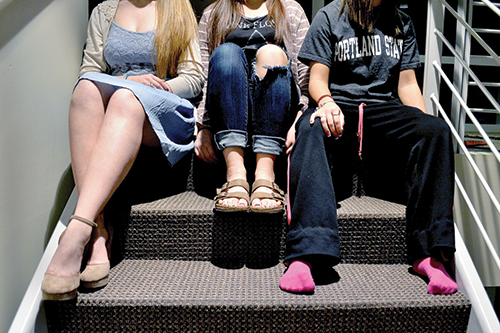New Year’s means lots of new beginnings: new school term, new political policies being signed or put into action, and new seasons of our favorite television programs. This new year marks the return of HBO’s hit show Girls. While many viewers are excited about the show’s second season, I’m not. And given friends’ reactions, along with the high level of negative Internet buzz, a large number of the show’s target audience aren’t, either.
Privilege check

New Year’s means lots of new beginnings: new school term, new political policies being signed or put into action, and new seasons of our favorite television programs.
This new year marks the return of HBO’s hit show Girls. While many viewers are excited about the show’s second season, I’m not. And given friends’ reactions, along with the high level of negative Internet buzz, a large number of the show’s target audience aren’t, either.
The plot follows a group of young women living in Brooklyn, with a focus on Hannah, a young writer whose parents have cut her off financially two years after she graduates from college. Episodes feature a variety of misadventures that are probably pretty common for people in their early- to mid-20s living in Brooklyn. However, many of the topics (including the portrayal of Brooklyn) are, for lack of a better term, problematic.
Many of the major plot lines are based on creator, head writer and star Lena Dunham. She’s been lauded as an indie darling for years because of her artistic upbringing and her 2010 debut film Tiny Furniture.
Dunham’s character, Hannah, follows a cliched English-major trajectory, first working an unpaid internship and then becoming a barista. As an English major myself, I often identified with Hannah. That’s likely true for many viewers.
As college students, we feel like we can identify with characters that are less-than-successful in their post-grad years. Portraying a young, wannabe writer as a barista perpetuates an all-too-accurate stereotype, but its familiarity is almost comforting. Almost.
I’ll admit, when I first heard about the show I was excited. Finally, a real look at what being in your 20s and living in Brooklyn is like.
Don’t pretend that that isn’t every English major’s pipe dream, all right?
However, my high expectations were dimmed—and eventually shattered. Girls isn’t the smart, eye-opening, coming-of-age drama/comedy that we need right now. The characters are flat and uninteresting, the name-dropping is near out of this world and every possible “indie vibe” cliche is present throughout.
Time Magazine’s James Poniewozik called Girls’ humor “raw, audacious, nuanced and richly, often excruciatingly funny.” Tim Goodman of The Hollywood Reporter praised it as “one of the most original, spot-on, no-missed-steps series in recent memory.” In the same review, Goodman says that the show’s cast and situations are “authentically scrubby and monochromatic (evocative of their personalities and New York as its setting).”
According to these guys, Girls is a rare gem and deserves its second season. So why shouldn’t we be excited about its return? Well, there’s the flat characters thing. If that’s not enough, the show’s diversity and portrayal of Brooklyn is completely skewed.
Brooklyn is one of the most ethnically diverse cities in the country, with just one-third of its population being white. The cast of Girls is almost 100 percent white, save for a few token characters given roles that depict persons of color in positions of subservience or roles that specifically play into racial and ethnic stereotypes.
Dunham et al., have been highly criticized for the lack of diversity and portrayal of persons of color. She defended herself in an interview with National Public Radio, saying that she didn’t write any African-American characters into the show’s intensely personal first season because she didn’t know any members of that community well enough to authentically portray their experience.
That’s great, it really is; however, when writing a show about young people living in Brooklyn, it’s important to showcase the environment for what it is, not as a whitewashed, indie-everything-all-the time utopia.
“The show will be on for a long time, so there’s plenty of time to have every type of person on the show,” coproducer Judd Apatow has said. He’s counting his chickens before they hatch. Statements like this make it seem like Dunham and Apatow made showing the privileged lives of white people a top priority, rather than including other narratives that might make the show appeal to an even broader and more diverse audience.
When it comes down to it, Girls is nothing more than an indie-infused Gossip Girl, or a Sex and the City for college-aged kids. It desperately wants to be groundbreaking, but before it can do that it needs to open its tattooed, flannel-clad arms to a little dose of intersectionality and a hint of diversity. This is Brooklyn after all; get with it, Lena Dunham.





Artistic oppression in the name of PC-consciousness!!
It’s based on her experiences and she had experiences mainly with white people. If you think the show is whitewashed then you must think her life was whitewashed which wouldn’t really be her fault.